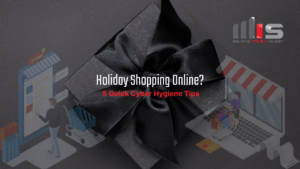
It’s the most wonderful (and risky) time of the year for online shoppers. Between Black Friday, Cyber Monday, and year-end sales, millions of consumers will spend hours browsing, buying, and clicking through digital deals. Unfortunately, cybercriminals are also gearing up for their own version of the holiday rush, launching phishing scams, fake online stores, and malware campaigns designed to steal your data or drain your wallet.
To stay safe while shopping online, keep these five simple but powerful cyber hygiene tips in mind:
- Stick to trusted sites.
Whenever possible, shop directly from official retailer websites or verified shopping apps. Avoid links sent via text, social media, or “too good to be true” promotional emails, these are common vehicles for phishing scams.
Bookmark your favorite stores and use their official apps for deals instead of searching each time. Cybercriminals often use fake ads or URLs that mimic real ones.
Pro tip: Always double-check the spelling of URLs and watch out for subtle character swaps like “amaz0n.com” or “bestbuy-deals.net.”
- Look for HTTPS and the lock icon.
Before you enter payment information or personal details, check the site’s address bar. It should begin with “https://” and display a padlock symbol; a sign that your connection is encrypted.
However, remember that HTTPS doesn’t guarantee legitimacy; it just ensures data encryption. When in doubt, manually type the retailer’s URL or use a saved bookmark.
- Avoid public Wi-Fi when shopping or banking.
Public networks; like those in cafes, airports, and malls, are breeding grounds for man-in-the-middle attacks, where hackers intercept your data. Instead, use your mobile hotspot or a Virtual Private Network (VPN) to secure your connection.
If you must use public Wi-Fi, avoid entering credit card details or logging into sensitive accounts until you’re on a secure network.
- Monitor your accounts frequently.
Check your bank statements and credit card activity regularly throughout the shopping season. Many banks and financial apps offer real-time transaction alerts, which can help you catch suspicious charges before they spiral.
Consider using fraud monitoring tools or enabling two-way notifications with your bank for added peace of mind.
- Use strong, unique passwords, and enable MFA.
Your email and online shopping accounts are gateways to sensitive data. Create strong, unique passwords for each account (a mix of upper/lowercase letters, numbers, and symbols) and use a password manager to keep them organized.
Most importantly, turn on Multi-Factor Authentication (MFA) wherever possible, especially for email, banking, and major retailer logins. MFA adds an extra security step that stops hackers even if they steal your password.
Cyber Tip: If a deal looks too good to be true, it probably is. Take a breath, verify the source, and stay one step ahead of scammers this season.
Protect your holiday and your business.
Don’t let cyber threats ruin your festive season. Schedule a free cybersecurity posture check with TeamMIS today and ensure your employees, networks, and data are protected from seasonal scams.

